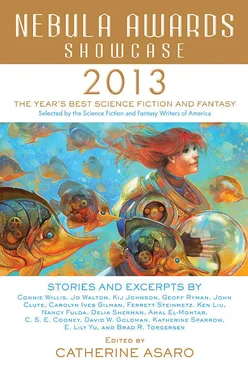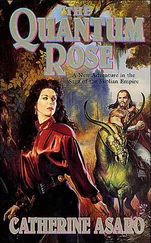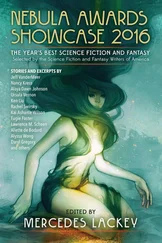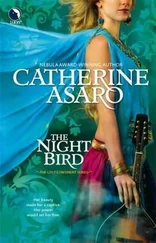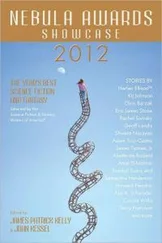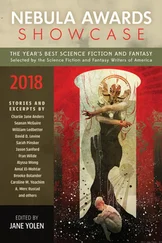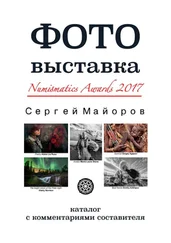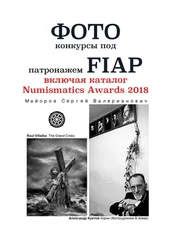Taking up his silver hand, I vow as how I’ve missed him
Missed his scales and his spackles and his webbed and clammy skin
“How choking is the incense! How blinding are the candles
After months spent in the darkness of your castle made of coral.
But it’s nice to see my father! Let’s go visit him this autumn!
We can introduce the children.”
The Sea King’s rapid smile is a dreadful shock of pleasure
Like a little boy’s first mischief, like a damsel’s foremost coyness
Like a man who’s given manna when he begged for stale bread
He cocks his head and murmurs through the tousles and the tangles:
“I never brought you lilies.”
My goblet runneth over, so I scold him, rather sternly:
“There is time enough for trinkets—
Time immortal, time forever, time for starfish in my bathtub
Time for flowers and a foot rub, time for tokens meant
For me alone—and not some ghostly maiden, be she
Ever pure and pious, be she pretty as a lily
For you see, my doughty Sea King, I am from a doting family
And I know that you’ve been lonely, and I know I’m no Agneta—
But I’m warm and I am willing
I can offer what I offer, but it will not come to begging
Do you want me for you lover? Or pine for one who left you?”
The Sea King pauses, pondering
(I almost punch his face in) then he smiles like a
dolphin, like a green wave clean and leaping, and he solemnly incants:
“Come down with me, come under!
Come beneath and be my consort
I will tell you all my secrets, I will let you take me deeper
Where no Sea King dared to venture, where Agneta never wandered
You will whisper your desires, and together we’ll uncover
All the fire in the ocean.”
Then I give my awkward Sea King
This small thing that I’ve been saving
For a moment like this moment when both he and I are ready
First a kiss and then a promise, then a topple and a tumble
It is frantic, it is frenzied, and we finish in a fever
Come unclasped in joyous moisture
And he leads me to the river
Where we hear the children singing.
THE MAN WHO BRIDGED THE MIST
Kij Johnson
Kit came to Nearside with two trunks and an oiled-cloth folio full of plans for the bridge across the mist. His trunks lay tumbled like stones at his feet where the mailcoach guard had dropped them. The folio he held close, away from the drying mud of yesterday’s storm.
Nearside was small, especially to a man of the capital where buildings towered seven and eight stories tall, a city so large that even a vigorous walker could not cross in a day. Here hard-packed dirt roads threaded through irregular spaces scattered with structures and fences. Even the inn was plain, two stories of golden limestone and blue slate tiles with (he could smell) some sort of animals living behind it. On the sign overhead, a flat, pale blue fish very like a ray curvetted against a black background.
A brightly dressed woman stood by the inn’s door. Her skin and eyes were pale, almost colorless. “Excuse me,” Kit said. “Where can I find the ferry to take me across the mist?” He could feel himself being weighed, but amiably: a stranger, small and very dark, in gray—a man from the east.
The woman smiled. “Well, the ferries are both on this side, at the upper dock. But I expect what you really want is someone to oar the ferry, yes? Rasali Ferry came over from Farside last night. She’s the one you’ll want to talk to. She spends a lot of time at The Deer’s Hart. But you wouldn’t like The Hart, sir,” she added. “It’s not nearly as nice as The Fish here. Are you looking for a room?”
“I hope I’ll be staying in Farside tonight,” Kit said apologetically. He didn’t want to seem arrogant. The invisible web of connections he would need for his work started here with this first impression, with all the first impressions of the next few days.
“That’s what you think,” the woman said. “I’m guessing it’ll be a day or two—or more—before Rasali goes back. Valo Ferry might, but he doesn’t cross so often.”
“I could buy out the trip’s fares, if that’s why she’s waiting.”
“It’s not that,” the woman said. “She won’t cross the mist ’til she’s ready. Until she feels it’s right, if you follow me. But you can ask, I suppose.”
Kit didn’t follow but he nodded anyway. “Where’s The Deer’s Hart?”
She pointed. “Left, then right, then down by the little boat yard.”
“Thank you,” Kit said. “May I leave my trunks here until I work things out with her?”
“We always stow for travelers.” The woman grinned. “And cater to them too, when they find out there’s no way across the mist today.”
* * *
The Deer’s Hart was smaller than The Fish, and livelier. At midday the oak-shaded tables in the beer garden beside the inn were clustered with light-skinned people in brilliant clothes, drinking and tossing comments over the low fence into the boat yard next door where, half lost in steam, a youth and two women bent planks to form the hull of a small flat-bellied boat. When Kit spoke to a man carrying two mugs of something that looked like mud and smelled of yeast, the man gestured at the yard with his chin. “Ferrys are over there. Rasali’s the one in red,” he said as he walked away.
“The one in red” was tall, her skin as pale as that of the rest of the locals, with a black braid so long that she had looped it around her neck to keep it out of the way. Her shoulders flexed in the sunlight as she and the youth forced a curved plank to take the skeletal hull’s shape and clamped it in place. The other woman, slightly shorter, with the ash-blond hair so common here, forced an augur through the plank and into a rib, then hammered a peg into the hole she’d made. After three pegs the boatwrights straightened. The plank held. Strong, Kit thought. I wonder if I can get them for the bridge?
“Rasali!” a voice bellowed, almost in Kit’s ear. “Man here’s looking for you.” Kit turned in time to see the man with the mugs gesturing, again with his chin. He sighed and walked to the waist-high fence. The boatwrights stopped to drink from blueware bowls before the one in red and the youth came over.
“I’m Rasali Ferry of Farside,” the woman said. Her voice was softer and higher than he had expected of a woman as strong as she, with the fluid vowels of the local accent. She nodded to the boy beside her: “Valo Ferry of Farside, my brother’s eldest.” Valo was more a young man than a boy, lighter-haired than Rasali and slightly taller. They had the same heavy eyebrows and direct amber eyes.
“Kit Meinem of Atyar,” Kit said.
Valo asked, “What sort of name is Meinem? It doesn’t mean anything.”
“In the capital, we take our names differently than you.”
“Oh, like Jenner Ellar.” Valo nodded. “I guessed you were from the capital—your clothes and your skin.”
Rasali said, “What can we do for you, Kit Meinem of Atyar?”
“I need to get to Farside today,” Kit said.
Rasali shook her head. “I can’t take you. I just got here and it’s too soon. Perhaps Valo?”
The youth tipped his head to one side, his expression suddenly abstract. He shook his head. “No, not today, I don’t think.”
“I can buy out the fares if that helps. It’s Jenner Ellar I am here to see.”
Valo looked interested but said, “No,” to Rasali, and she added, “What’s so important that it can’t wait a few days?”
Читать дальше
